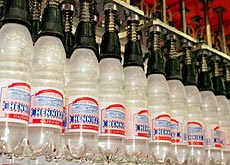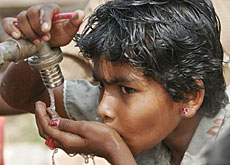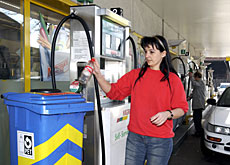Plastic bottle market hit by oil hikes

Drinks' manufacturers in Switzerland are warning that the high cost of crude oil could push up the price of beverages in plastic bottles.
The reason is because crude oil is used in the manufacture of certain types of plastic bottles.
Bottled drinks are just the latest products whose prices are facing upward pressure because of the oil price. Drinks’ producers say a price hike is almost certain, but consumers may be spared till January.
“We will adapt our prices by several centimes from January 1, 2006,” said Nicolas Rouge, the head of Henniez, which produces bottled water and other soft drinks.
One of the main factors influencing this decision is the price of PET (polyethylene terephthalate) plastic, which is made from crude oil. The cost of PET has risen by 15 per cent since October 2004.
According to a Nestlé spokeswoman, price rises have already taken place in several markets. The multinational currently has 77 different brands of bottled water.
It says that the impact of the price of oil “is not neutral”. Coca-Cola Switzerland has a similar view, but is not yet intending to raise prices.
The price of oil has spiralled over the past year-and-a-half, rising from $30 (SFr38.4) a barrel at the beginning of 2004, to a high of $70 two months ago after Hurricane Katrina devastated parts of the Gulf Coast of the United States. It has now settled at around $60 a barrel.
Alternatives
Many drinks’ producers do not believe that oil prices will fall in the foreseeable future and have meanwhile been trying to reduce costs.
This is the case at Seba Aproz, which provides mineral water for supermarket chain Migros. “Productivity gains have allowed us to compensate rising costs,” said Migros spokeswoman Monika Weibel.
Nestlé Waters division has also been trying to limit the impact of the rise on its production costs, such as reducing the weight of bottles, said a spokeswoman.
A 1.5-litre bottle now weighs 30 grams. It is estimated that around 1.9 kilograms of crude oil is needed to make one kilo of PET.
But Henniez’ Rouge warns that alternatives also have to be found to reduce the weight of bottles. A bottle that is too light is simply too soft and not very practical.
Producers of cardboard packaging for drinks, which use about 20 per cent polyethylene, have also been trying to limit their dependence on oil by trying to cut down on the amount of polyethylene needed.
Spared
For the time being, consumers seem to be spared the effects of the high price of oil. Switzerland’s biggest distributors, Migros and Coop, say they have not raised bottled water prices in their outlets.
Coop refuses to speculate on the future, whereas as Migros’ Weibel says that in a competitive market any price rise would be “counter-productive”.
However, consumers’ groups believe that higher prices are inevitable. Aurélian Mabon, from the French-speaking Consumers’ Association said it was a classic macro-economic law.
“[It’s] regrettable that everything is so dependent on oil prices,” he added.
swissinfo with agencies
PET stands for polyethylene terephthalate, the material used for many plastic drinks bottles.
It is an oil derivative – 1.9 kg crude oil is needed for 1kg PET.
It is shock resistant and keeps out gases.
Cardboard drinks packaging also contains up to 20% polyethylene.
The price of crude oil has doubled since the beginning of 2004, and is now at around $60-a-barrel.

In compliance with the JTI standards
More: SWI swissinfo.ch certified by the Journalism Trust Initiative


You can find an overview of ongoing debates with our journalists here . Please join us!
If you want to start a conversation about a topic raised in this article or want to report factual errors, email us at english@swissinfo.ch.